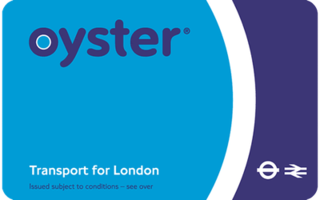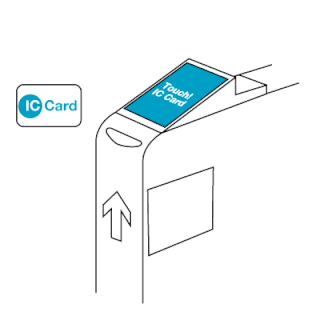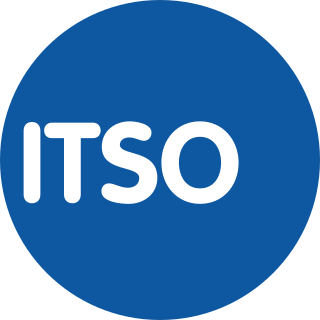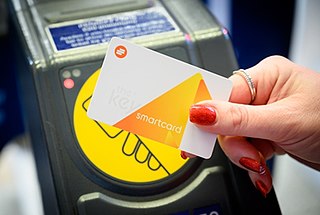
The Oyster card is a payment method for public transport in London, England, United Kingdom. A standard Oyster card is a blue credit-card-sized stored-value contactless smart card. It is promoted by Transport for London (TfL) and can be used on as part of London's integrated transport network on travel modes including London Buses, London Underground, the Docklands Light Railway (DLR), London Overground, Tramlink, some river boat services, and most National Rail services within the London fare zones. Since its introduction in June 2003, more than 86 million cards have been used.

The EZ-Link card is a rechargeable contactless smart card and electronic money system that is primarily used as a payment method for public transport such as bus and rail lines in Singapore. A standard EZ-Link card is a credit-card-sized stored-value contact-less smart-card that comes in a variety of colours, as well as limited edition designs. It is sold by SimplyGo Pte Ltd, a merged entity of TransitLink and EZ-Link since 2020, a subsidiary of the Land Transport Authority (LTA), and can be used on travel modes across Singapore, including the Mass Rapid Transit (MRT), the Light Rail Transit (LRT), public buses which are operated by SBS Transit, SMRT Buses, Tower Transit Singapore and Go-Ahead Singapore, as well as the Sentosa Express.

Transport for West Midlands (TfWM) is the public body responsible for co-ordinating transport services in the West Midlands metropolitan county in England. It is an executive body of the West Midlands Combined Authority (WMCA), with bus franchising and highway management powers similar to Transport for London. TfWM's policies and strategy are set by the Transport Delivery Committee of the WMCA.

The Clipper card is a reloadable contactless smart card used for automated fare collection in the San Francisco Bay Area. First introduced as TransLink in 2002 by the Metropolitan Transportation Commission (MTC) as a pilot program, it was rebranded in its current form on June 16, 2010. Like other transit smart cards such as the Oyster card, the Clipper card is a credit card-sized stored-value card capable of holding both cash value and transit passes for the participating transit agencies. In addition to the traditional plastic card, Clipper is available as a virtual card in Google Wallet and Apple Wallet. Clipper is accepted by nearly all public transit services in the Bay Area, including but not limited to Muni, BART, Caltrain, AC Transit, SamTrans, Golden Gate Transit, Golden Gate Ferry, San Francisco Bay Ferry, and VTA.

The Tyne and Wear Passenger Transport Executive, branded as Nexus, is an executive body of the North East Combined Authority and is best known for owning and operating the Tyne and Wear Metro. It replaced the Tyneside PTE on 1 April 1974.

ITSO Ltd is a non-profit membership organisation assisting standardisation of public transport ticketing in the United Kingdom.

Rail operators are government-assisted profit-based corporations, fares and ticketing on Singapore's Mass Rapid Transit (MRT) system are aimed to break-even or exceed operating expenses. Rail operators collect fares based on account-based (ABT) and card-based ticketing options, the prices of which are calculated based on the distances travelled between the origin and destination. These prices increase in stages for standard non-concessionary travel, according to the distances travelled. In account-based ticketing, the fare is automatically calculated in the back-end and charged to the passenger post journey. On the other hand, card-based ticketing is proprietary to the transport network and the fare is computed by the system based on the store values recorded in the cards. The public transit system is harmonising towards full ABT.
The London Underground and Docklands Light Railway (DLR) metro systems of London, England uses a mix of paper and electronic smart-card ticketing.

Network for Electronic Transfers, colloquially known as NETS, is a Singaporean electronic payment service provider. Founded in 1986 by a consortium of local banks, it aims to establish the debit network and drive the adoption of electronic payments in Singapore. It is owned by DBS Bank, OCBC Bank and United Overseas Bank (UOB).

get me there is an electronic ticketing scheme under development by Transport for Greater Manchester (TfGM) for use on public transport services in Greater Manchester, England. It was first announced and confirmed as an integrated travel card, comparable to London's Oyster card, for Greater Manchester in June 2012, following a bid from the Greater Manchester Combined Authority.

A transit pass or travel card, often referred to as a bus pass or train pass etc., is a ticket that allows a passenger of the service to take either a certain number of pre-purchased trips or unlimited trips within a fixed period of time.
The go card is an electronic smartcard ticketing system developed by Cubic Corporation, which is currently used on the Translink public transport network in South East Queensland, Australia. To use the go card, users hold the card less than 10 cm away from the reader to "touch on" before starting a journey, and must do the same to "touch off" the service at the end of the journey. The cost of each journey is deducted from the go card balance.

Opal is a contactless smartcard fare collection system for public transport services in the greater Sydney area and most other urban areas of New South Wales, Australia. Operation of the Opal system is managed by Transport for NSW. First launched in late 2012, Opal is valid on Transport for NSW's metro, train, bus, ferry and light rail services that operate in Sydney and the neighbouring Central Coast, Hunter Region, Blue Mountains, Illawarra and Southern Highlands areas. Opal equipment was designed from the start to support a variety of cards, but launched with the captive Opal cards.

Rail service fares in Greater London and the surrounding area are calculated in accordance with the London fare zones system managed by Transport for London. Within London, all London Underground, National Rail, London Overground, Elizabeth Line and Docklands Light Railway stations are assigned to six fare zones. Fare zone 1 covers the central area and fare zones 2, 3, 4, 5 and 6 form concentric rings around it. Some National Rail stations and almost all Transport for London served stations outside Greater London in the home counties of Buckinghamshire, Essex, Hertfordshire and Surrey are either included in fare zones 4, 5 or 6 or in extended zones beyond these. Transport for London fare zones are also known simply as zones or travelcard zones, referring to their use in calculating prices for the travelcards or pay-as-you-go caps. Before flat fares were introduced in 2004, fare zones were used on the London Buses network. London fare zones are also used for calculating the cost of single and return paper tickets, Oyster card pay-as-you-go fares and season tickets.

Contactless smartcards are being progressively introduced as an alternative option to paper ticketing on the National Rail system of Great Britain. Tickets for use on National Rail services can be loaded onto any ITSO card.

The Key is a contactless ITSO-compatible smartcard developed by the Go-Ahead Group used on buses, trains and other forms of public transport across various areas of the United Kingdom.

MetroCARD is a contactless smartcard ticketing system for public transport services in the Adelaide city and suburbs in South Australia. The system is managed by Adelaide Metro and is usable on their bus, train and tram services.

The West Midlands Passenger Transport Executive (WMPTE) was the public body responsible for public transport in the West Midlands metropolitan county in the United Kingdom from 1969 until 2016. The organisation operated under the name Centro from 1990, and was publicly branded as Network West Midlands from 2005.
Google Wallet is a digital wallet platform developed by Google. It is available for the Android, Wear OS, and Fitbit OS operating systems, and was announced on May 11, 2022, at the 2022 Google I/O keynote. It began rolling out on Android smartphones on July 18, 2022.

















